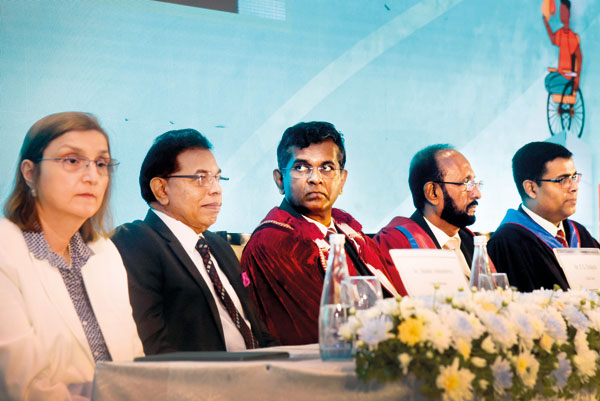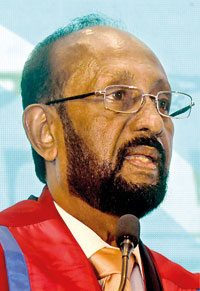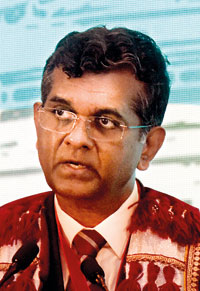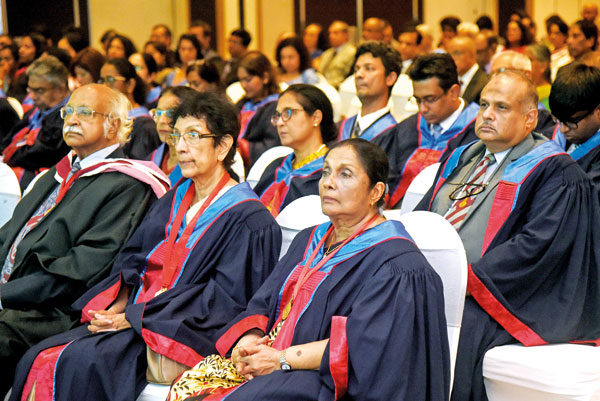News
‘Evidence-based’ or ‘evidence-biased’ medicine, asks expert
View(s):Delivering the SLMA Oration 2024, Prof. Athula Sumathipala spotlights glaring global disparities in research publications & under-representation of LMICs
By Kumudini Hettiarachchi
The focus on such disparities was in the SLMA Oration 2024 titled ‘Global divide in health and research; ethical and governance challenges for low- and middle-income countries’ delivered by Prof. Athula Sumathipala which followed the inauguration presided over by SLMA President Dr. Ananda Wijewickrama.

The head table at the inauguration (from left): Guest-of-Honour & WHO Sri Lanka’s Public Health Administrator, Dr. Shalala Ahmadova; Chief Guest & Health Ministry Secretary, Dr. Palitha Mahipala; SLMA President Dr. Ananda Wijewickrama; SLMA Orator Prof. Athula Sumathipala; and SLMA Secretary Dr. Lahiru Kodituwakku. Pix by Akila Jayawardena
“There is a profound of stark global disparity: the division between the affluent nations of the global North (High-Income Countries – HICs) and the less affluent nations of the global South (Low- and Middle-Income Countries – LMICs). This disparity spans across various facets including health resources, healthcare accessibility, research funding, research publications and authorship,” pointed out Prof. Sumathipala, reiterating that such a division gives rise to numerous ethical quandaries and dilemmas.
A renowned researcher and Director of the Institute for Research and Development in Health and Social Care (Colombo), Prof. Sumathipala who is also Secretary General of the International Society for Twin Research, had based his oration on over 20 research publications in high-impact peer-reviewed journals and book chapters in books related to ethics, authored/edited by leaders in ethics research. These had been published by prestigious institutions such as the World Health Organization (WHO), Medical Research Council of the United Kingdom (UK) and the Oxford University Press. He is also Chairman of the National Institute for Fundamental Studies, Kandy and Emeritus Professor of Global Mental Health at Kings College London and Emeritus Professor of Psychiatry at Keele University UK.

Prof. Athula Sumathipala
Presenting research findings from studies focusing on the global disparities in research publications, highlighting the under-representation of LMICs in research literature, he examined research on disaster-related topics, issues surrounding informed consent, governance in data-sharing and bio-banking and public comprehension of research, particularly in genomic studies.
While outlining initiatives in building research ethics capacity, particularly from the perspective of LMICs, aimed at enhancing research ethics and governance in Sri Lanka and across South Asia, Prof. Sumathipala discussed the broader impacts stemming from these efforts, which extend beyond mere publication outputs.
Only around 6% of mental health research is reported in leading journals published in the west, from countries where 90% of the global population lives, was an eye-opener from a research done by Prof. Sumathipala in 2000. “It is similar for research reported on physical illnesses too. These publications led to bringing the world’s attention to the issue of severe under-representation of LMICs.”
These journal surveys repeated after 20 years had revealed that it had increased only up to 15%, he said, stressing that “this is not good enough”.
He questioned whether the so-called “evidence-based medicine” is actually “evidence-biased medicine”, while arguing that more local research needs to be carried out.
Presenting the work carried out by him and his team which has had global impact, he said that every researcher has a moral and ethical obligation to build capacity in research and governance and in the three essential pillars in global health collaborations: research, ethics and community engagement and involvement (CEI). 
“We believe research excellence can only be achieved through a holistic approach, involving deep understanding, practice and capacity development in each of these three inter-related pillars. Such capacity building should be across whole teams, not confined to early-mid career researchers. This should encompass research prioritization, data sharing, equity, authorships and funding,” added Prof. Sumathipala, who is the only person who has delivered three previous orations at the SLMA annual sessions.
Earlier, SLMA President Dr. Ananda Wijewickrama, recalled how towards the end of last year, the health system was on the verge of collapse and many essential medicines were out-of-stock or not available not just in state hospitals, but also private hospitals. Providing healthcare became a challenge and that was why the SLMA selected the theme ‘Ensuring equity in healthcare during challenging times’ for the three-day congress.
Pointing out that a key issue raised by the SLMA during 2023 under the leadership of Dr. Vinya Ariyaratne was purchasing of drugs of uncertain quality using emergency purchasing methods, he said they were thankful that it had been stopped and steps taken to purchase quality-assured drugs. The SLMA together with the Health Ministry, other professional colleges and associations had also been able to reduce the essential drug list from 1,500 to 800. The list is being further revised.
Constructive criticism being an essential part of improvement, he said that the SLMA has been involved in providing such criticism on many important health issues. One was the proposal to reduce the consenting age for sex for girls to 12 from 16 years which was withdrawn after their intervention.
“We have also raised concerns over the delay in implementing the new food regulation of Sri Lanka,” he added, going onto spotlight other critical matters that were discussed at the congress.

The distinguished gathering
The best way to say that you found the home of your dreams is by finding it on Hitad.lk. We have listings for apartments for sale or rent in Sri Lanka, no matter what locale you're looking for! Whether you live in Colombo, Galle, Kandy, Matara, Jaffna and more - we've got them all!

